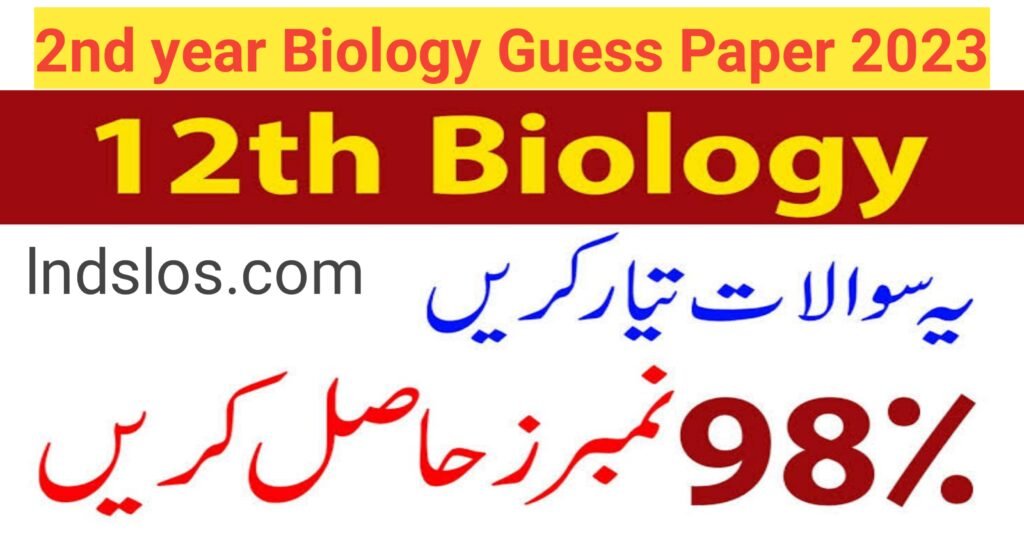
2nd Year Biology Guess Paper 2023
2nd Year Biology Guess Paper 2023
Introduction
The 2nd year Biology guess paper is a study guide that can help students prepare for their upcoming exams. The paper covers a wide range of topics, including cell biology, genetics, evolution, ecology, and human biology.
Important Topics
Some of the most important topics that students should focus on include:
- Cell biology: This topic covers the structure and function of cells.
- Genetics: This topic covers the principles of heredity and how genes are passed from parents to offspring.
- Evolution: This topic covers the process of evolution and how different species have come to be.
- Ecology: This topic covers the interactions between organisms and their environment.
- Human biology: This topic covers the structure and function of the human body.
Tips for Studying
Here are a few tips for studying for the 2nd year Biology guess paper:
- Make a study schedule and stick to it.
- Review the important topics regularly.
- Practice answering questions from past papers.
- Get help from a tutor or teacher if you need it.
Conclusion
The 2nd year Biology guess paper can be a challenging exam, but by studying hard and following the tips above, students can increase their chances of success.
Keywords: 2nd year Biology guess paper, 2023, biology, cell biology, genetics, evolution, ecology, human biology, study guide, exam preparation, tips, study schedule, past papers, tutor, teacher.
Bio guess papers 2023 2024 Punjab Board
12th Biology Guess 2023
Chapter 15
Important Short questions
- Define homeostasis with examples.
- What are heat shock proteins?
- What is hypertonic and hypotonic environment and what changes occur in cell in this environment?
- Differentiate between osmoconformers and osmoregulators.
- Differentiate between active flight and passive flight.
- Differentiate between shivering thermogenesis and non-shivering thermogenesis.
- Define endotherms, ectotherms and heterotherms.
- Write four adaptations of xerophytes and hydrophytes and mesophytes.
- Differentiate between fibres and sclereides.
- Differentiate between afferent and efferent arterioles.
- Define lithotripsy.
- What is haemodialysis? Give its importance.
- What is foramen triosium? How is it formed?
- What is renal failure?
- Differentiate between ureotelic and urecotelic animals.
- Define anhydrobiosis with an example.
- What is hyproxaluria?
- Differentiate between photonasty and thermonasty.
- Define phototactic and chemotactic movements with examples.
Important Long Questions
- Discuss excretion in Plants.
- Discuss Kidney disorders with treatment.
- Discuss the role of liver as an excretory organ.
- Discuss the system of thermoregulation in mammals.
Chapter 16
Important Short Questions
- Differentiate between bone and cartilage.
- Name the unpaired facial bones.
- Differentiate between epical, lateral and intercalary meristems.
- What is blastoderm? Name its layers.
- What is hematoma formation?
- How callus is formed?
- What is a synovial joint?
- Give composition of exoskeleton in molluscs and arthropods.
- Differentiate between hyaline and fibro cartilage.
- What is sciatica and its causes?
- Differentiate between effective and recovery strokes?
- What is non-disjunction? Give its effects.
- What is rickets? Give its causes and treatment.
- Differentiate between tendons and ligaments.
- What are the internal factors which affect the process of growth?
- What is secondary growth? Give its importance.
- What are brnachialis and branchioradialis?
Important Long Questions
- What is endoskeleton? Describe bone and cartilage.
- Describe the significance of secondary growth in plants. Phases of plants growth.
- Give a detailed note on sliding filament model.
- Explain the main parts of axial skeleton and appendicular skeleton.
- Explain different types of joints.
Chapter 17
Important Short Questions
- What are effectors? Give their types.
- Name only types of innate behaviour.
- Differentiate between neurula and neurocoel.
- Define primary organizer and primary induction.
- Draw and label sensory neuron.
- Define reflex arc.
- Differentiate between nerves and ganglia.
- What is salutatory impulse?
- What is effects of nicotine on coordination?
- What is chlorosis?
- What is a hormone? List its type.
- Define habituation with an example.
- Give functions of parathyroid gland and adrenal gland.
- What is Alzheimer’s disease?
Important Long Questions
- Nervous system of hydra is better developed than that of planaria. Discuss.
- Explain the structure and functions of human brain with diagram.
- Write a note on adrenal gland.
- How nerve impulse is produced? Explain its mechanism with diagram?
Chapter 18
Important Short Questions
- Differentiate between sexual and asexual reproduction.
- Define parthenocarpy. Give examples.
- What is seed dormancy? Give its importance.
- What is photoperiodism? Give its effects on plants.
- Define vernalisation. Write its two advantages.
- Define tissue culture and cloning with examples.
- Differentiate between identical and fraternal twins.
- Differentiate between oviparous and viviparous.
- Define menstrual cycle, oestrous cycle and menopause.
- What is diploid parthenogenesis?
- What is structure and function of corpus leuteum?
- Name STDs with their relative causative agents.
- Define apormixis.
- Defined haploid and diploid parthenogenesis?
- What is ovulation?
Important Long Questions
- Explain the female menstrual cycle.
- Explain the male reproductive system of man.
- Compare asexual reproduction with sexual reproduction.
- Elaborate the functions of placenta during pregnancy.
Chapter 19
Important Short Questions
- Differentiate between growth and development.
- Differentiate between epical, lateral and intercalary meristems.
- Write three signs of aging.
- Give two causes of abnormal development.
- What is blastoderm? Name its layers.
- What are the internal factors which affect the process of growth.
- What is discoidal cleavage.
- Differentiate between neurula and neurocoel.
- What is organogenesis?
- Define regeneration with example.
- What is meristem ?
- What do you know about open growth?
- Differentiate between morulla and blastolua stage in the development of chick.
- What is basic difference between chick and amphibian embryo?
- Define correlation?
- Define hypoblast and epiblast?
- Describe the role of cytoplasm in development?
- What is meant by differentiation?
Important Long Questions
- Write a note on development of chick.
- Describe the signs and causes of abnormal development.
- Explain internal and external factors of growth.
- Explain the phases of growth in plants.
Chapter 20
Important Short Questions
- Define recombinant DNA. Role of lambda phage.
- What is anticodon?
- What is karyotype?
- Write 3 major classes of RNA
- What is mutation?
- Where does DNA replication start on the DNA molecule?
- Define transformation process?
- Define chromosomes and nucleosome?
- Define semi-conservative replication?
- Explain sex limited traits.
- What is phosphodiester linkage?
- Write the main component of DNA.
- Define point mutation and chromosomal aberration.
- What are Okazaki fragments? Give their length.
- Differentiate between transcription and translation?
Important Long Questions
- Describe DNA as Hereditary material in details?
- Explain the works of Meselson and Stahi in DNA study.
- What are chromosomes? What do you know about their types.
- Explain Watson and Crick model of DNA.
Chapter 21
Important Short Questions
- What is non-disjunction? Give its effects?
- Define cell cycle. Give its phases.
- How cytokinesis occur in animals and plants
- What is mitotic apparatus? Give its functions.
- Explain homologous and analogous organs.
- Give importance of mitosis/meiosis.
- What is metastasis? Write its importance.
- Differentiate between apoptosis and necrosis.
- Write the symptoms and causes of Down’s syndrome?
- What is Turner’s syndrome? Give its causes and feature.
- Define crossing over.
- What is meant by G0 phase?
- How prophase of meiosis differ from that of mitosis?
- What is chiasmata?
- What is interphase? Why is it called resting phase?
Chapter 22
Important Short Questions
- Define euchromatin.
- What is cretinism?
- Describe gonorrhoea.
- What is transformation?
- What is allele and gene and gene pool and gene frequency?
- What is over dominance and co-dominance?
- What is genetic drift? Genetic code. Fixed alleles.
- Name any four animals declared extinct in Pakistan.
- Define homozygous and heterozygous alleles.
- What is Epistasis? What is Bombay Phenotype? Dominance?
- Differentiate between genotype and phenotype.
- What is totipotency and totipotent cell?
- What is true breeding variety?
- What is meant by MODY?
Important Long Questions
- Explain epistasis with an example of Bombay phenotype.
- Define and explain Mendel’s Law of segregation.
- What is incomplete dominance? Explain with an example.
- Explain the phenomenon of gene linkage regarding linkage groups.
Chapter 23
Important Short Questions
- Define biotechnology. Give its applications.
- Differentiate between molecular scissors and molecular vectors.
- Give two requirement to produce recombinant DNA.
- Explain and give examples of ex vivo and in vivo gene therapies in humans.
- What are transgenic plants?
- Give three possible ways to get the gene of interest.
- Give two goals of human genome project.
- What is probe? Give its uses.
- Define genomic library.
Chapter 24
Important Short Questions
- How artificial selection is different from natural selection.
- State theory of special creation.
- Name any four animals declared extinct in Pakistan.
- Define neo Darwinism/modern synthesis?
- Define population genetics.
- What are hydrothermal vents? How do they support life?
- What are vestigial organs? Name some important vestigial organs of man.
- Define fossils? How do they provide evidence of evolution?
- What are endangered and threatened species? Give some examples.
- What is Hardy-Weinberg theorem? Give its equation.
- Differentiate between homologous and analogous organs.
- State endosymbiont hypothesis.
Important Long Questions
- Discuss evolution from prokaryotes to eukaryotes.
- Describe the evidences of evolution various branches of biology like biogeography and fossil study.
- Explain Darwin’s theory of natural selection.
Chapter 25
Important Short Questions
- Write down the types of living organisms found in limnetic zone. (its life) (2)
- Differentiate between climate and weather. (3)
- Define renewable and non renewable resources. (5)
- Define ecosystem, biosphere and biome.
- Differentiate between population and community with examples.
- Differentiate between synecology and autecology.
- What is predation? Give its significance.
- Define parasitism and commensalism.
- Define food chain and food web.
- Differentiate between habitat and niche.
- Differentiate between consumers and decomposers.
- Differentiate between hydrosere and xerosere.
- Differentiate between primary succession and secondary succession.
Important long questions
- Write a note on nitrogen cycle.
- Explain the biotic components of an ecosystem.
- Explain xerosere succession stages.
- Explain the flow of energy in a food chain.
Chapter 27
Important Short Questions
- Define deforestation and afforestation.
- What is ozone layer? Give its important function in environment.
- Define water pollution and acid rain.
- Write a brief note on non-renewable energy resources.
- Explain causes and effects of ozone depletion.
- Give main causes/sources of water pollution.
- What is solid waste? Give its importance.
- Define greenhouse effect. Give its effects on environment.
- Trees as environmental buffers.
Important long questions
- Describe deforestation and its effects.
- Write a note on: a)ozone depletion b)greenhouse effect
- Explain the importance of forests/trees
- Briefly explain and causes and effects of air pollution.
Download 2nd year Biology Guess Paper 2023 2024 2025 pdf
| Subject | Chapter | Important Questions |
|---|---|---|
| Biology | Cell Structure and Function | * What is a cell? * What are the different types of cells? * What are the functions of the cell membrane? * What are the functions of the nucleus? * What are the functions of the cytoplasm? |
| Biology | Metabolism | * What is metabolism? * What are the different types of metabolism? * What are the enzymes involved in metabolism? * What are the products of metabolism? * What are the energy cycles involved in metabolism? |
| Biology | Respiration | * What is respiration? * What are the different types of respiration? * What are the respiratory organs? * What are the respiratory gases? * What are the respiratory disorders? |
| Biology | Circulation | * What is circulation? * What are the different types of circulation? * What are the circulatory organs? * What are the blood components? * What are the blood diseases? |
| Biology | Digestion | * What is digestion? * What are the different types of digestion? * What are the digestive organs? * What are the digestive enzymes? * What are the digestive disorders? |
| Biology | Excretion | * What is excretion? * What are the different types of excretion? * What are the excretory organs? * What are the excretory wastes? * What are the excretory disorders? |
| Biology | Reproduction | * What is reproduction? * What are the different types of reproduction? * What are the reproductive organs? * What are the reproductive hormones? * What are the reproductive disorders? |
| Biology | Genetics | * What is genetics? * What are the different types of genes? * What are the chromosomes? * What is DNA? * What are the genetic disorders? |
| Biology | Evolution | * What is evolution? * What are the different theories of evolution? * What are the evidences of evolution? * What are the evolutionary disorders? |
2nd Year Biology Guess Paper 2023 | Punjab Boards
2nd year Biology guess papers 2023 are available for All Punjab Board …
2nd Year Biology Guess Paper 2023 Punjab Boards
2nd Year Biology Guess Paper 2023 Punjab Board
2nd year biology guess paper 2023 all Punjab Board
12th Class Biology Guess Paper 2023 Punjab Board | 2024
Important long questions of biology 2nd Year Chapter wise 2023
2nd year Physics Guess Paper 2023
Important long Questions of Biology 2nd year Chapter 23
12th Class Biology Guess Paper 2023 PDF
2nd Year (12th class) Biology Guess Paper Solved 2023
2nd Year Biology Guess Papers 2023 (Punjab Board PDF) – Study Notes
Taleem city Biology Guess Paper 2023








Leave a Reply